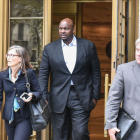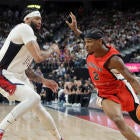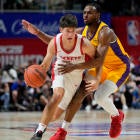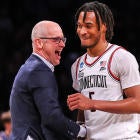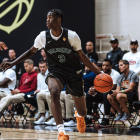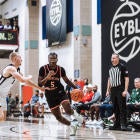It's been 16 days since four assistant coaches, two shoe company executives, an agent, a financial advisor, a man who runs a grassroots program and the owner of a clothing company were charged with various crimes related to an ongoing FBI investigation that's helped expose the underbelly of college basketball. To date, all have stayed publicly quiet and declined opportunities to insist they did not do what they're accused of doing. And, far as I know, nobody who works with any of them has stepped up, vouched for them and insisted they did not do what they're accused of doing.
It's interesting, isn't it?
Their careers are in tatters, their freedom in jeopardy, and all we have is some carefully-worded non-denials from high-paid lawyers with full hands. And that's because we're not dealing with baseless allegations here. These men's voices are on tape thanks to wiretaps. Their conversations are on video thanks to a bugged hotel room. Their dealings are uncovered thanks to documents subpoenaed. Which is why they're going to have a difficult time pretending they didn't do what they're accused of doing. So their best bet, most seem to think, is to simply cut a deal to reduce the damage, cooperate, flip and turn on people they've long called friends -- but only after they ask a big legal question. And that big legal question is this: Is what I'm accused of doing really a federal crime?
"They have to know they have no chance arguing they didn't do what they're caught on tape doing," a source told CBS Sports. "So what they'll end up doing is basically saying, "OK, I did these things. I was wrong. But these things aren't federal crimes.'"
As the kids say, good luck with that.
It reminds me of January 2001.
I was a young reporter back then at The Commercial Appeal newspaper when a combination of hard work, luck and the cooperation of a high school football coach named Milton Kirk allowed me to uncover a scandal and report that a high school football coach named Lynn Lang had accepted a large amount of money from a booster named Logan Young to steer a prospect named Albert Means to Alabama. Not long after my initial story published, a federal grand jury was convened. And, ultimately, that led to federal charges being brought against Young, Lang and Kirk -- all of whom initially tried to argue that even if they did what they were accused of doing, what they were accused of doing was not a federal crime.
It did not work.
Lang and Kirk eventually cut a deal and pleaded guilty. Young went to trial and was found guilty of conspiracy, bribery and money laundering. Which means there's absolutely a precedent for men being convicted of federal crimes for conspiring to steer a prospect in a certain and specific direction. Which is why the "what we did is not a federal crime" argument isn't likely to work.
Is this a creative and arguably loose interpretation of federal law?
Perhaps.
I thought that in 2001 and still think it now. But that doesn't change the fact that high-powered lawyers -- Lang was defended by A C Wharton, who would later serve as the 63rd mayor of Memphis; Young was defended by former Watergate prosecutor James F. Neal -- have previously failed spectacularly trying to argue that men conspiring to guide players in a certain and specific direction isn't a federal crime. And it doesn't change the fact that everybody who was charged with a federal crime in that case -- a case that resulted in heavy NCAA sanctions being placed on Alabama -- was ultimately convicted of at least one federal crime.
Which I assume will also happen in this scandal.

So far 10 men have been charged. And once they realize their "what we did is not a federal crime" argument isn't going to work, most believe they'll cut a deal to reduce the damage, cooperate, flip and turn on people they've long called friends -- which could obviously send this investigation in a number of different directions and will likely lead to more arrests. In other words, this is far from over, destined to grow and capable of staining some of college basketball's biggest names and programs. Which is why, less than a month away from the start of the season, almost nobody is talking about the start of the season.
Men with stories to tell are facing federal prison.
So they're going to talk.
They might not have known they were committing federal crimes when they did what they are accused of doing. But that's way beside the point now. Because, what we learned 16 days ago, is that they have been charged with federal crimes for doing what they are accused of doing. And my history of covering cases like this suggests those charges are going to stick.








